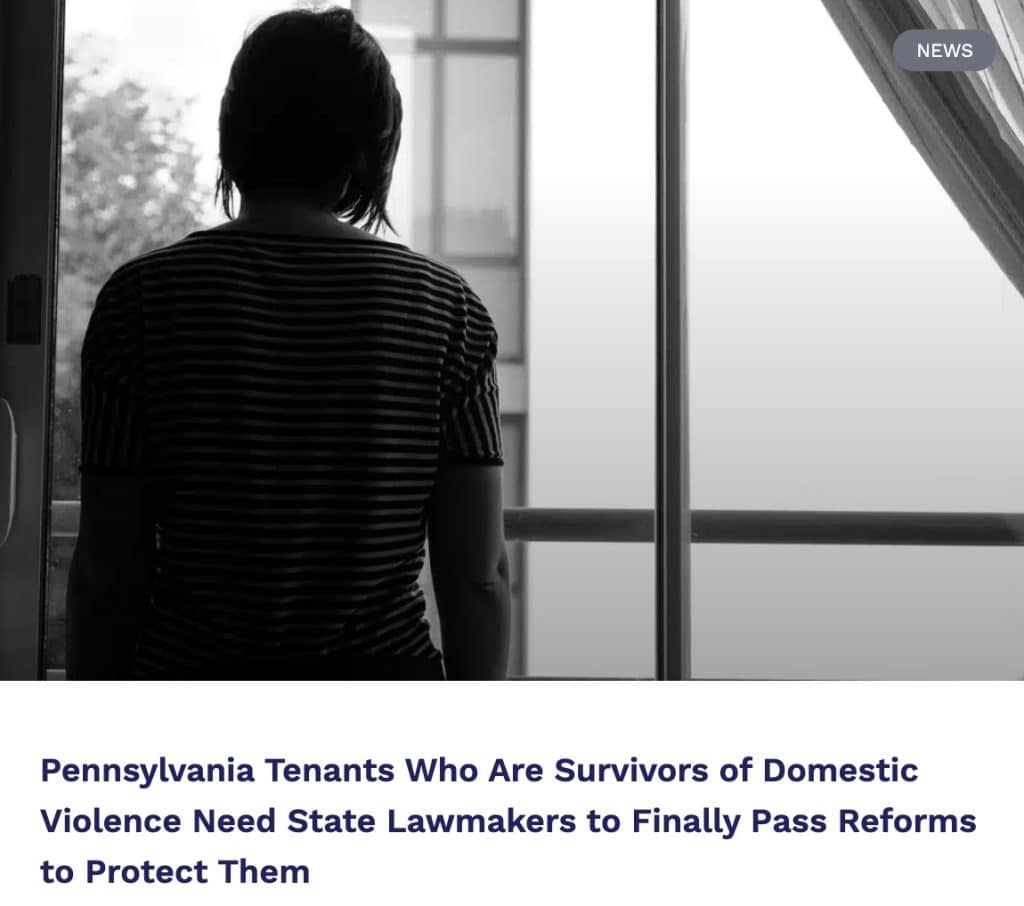According to Pennsylvania’s Blackburn Center, the National Network to End Domestic Violence annual survey – conducted on a single day in 2024 – more than 2,000 individuals and their children sought refuge in one of the commonwealth’s domestic violence shelters.
In a single day, 2,006 Pennsylvanians feared for their lives to such an enormous extent that – with no trusted family or friends to turn to – they hid from their abusers, staying with total strangers at emergency shelters.
Meanwhile, a nearly equal number received assistance with transportation, court accompaniment, counseling, or other vital services.
Additionally, every hour of that one day, another 37 individuals reached out to domestic violence hotlines for guidance or help.
As Pennsylvania enters its 14th week without a budget, domestic violence shelters in the commonwealth’s most rural counties are failing. Governmental policy makers at every level have left these specialized non-profit agencies battered and bruised.
One agency director, speaking on condition of anonymity because she fears federal funding retribution against her agency if she comments publicly, explained, “We saw this coming when DOGE started canceling entire funding sources. In April we cut everyone back to 32 hours.” The agency’s executive director explained that all senior staff salaries were cut by 25% as well.

Still, after five months of trimmed salaries, it’s clear that rural domestic violence shelters can’t weather the storm created by nearly three concurrent months without state funding.
Most of this executive director’s staff are gone now. She’s operating her shelter at half capacity and turning people away. “We had 22 beds. We’re down to 11 or 12 – depending on if we have a mom with a young child.”
The executive’s full complement of 17 employees is down to five. Three of those – the executive director included – are salaried and still working for 75% of their weekly pay but often working twice their regular hours as they cover their domestic violence hotline from 11 p.m. to 5 a.m., along with their regular duties.
Relying on a neighboring county’s hotline services from 5 p.m. until 11 p.m., the rural shelter’s salaried staff manages the hotline overnight when they should be sleeping. Then they go back to work the following day.
When asked if she’d contacted her representatives, she told the Bucks County Beacon, “I haven’t been able to go to Harrisburg, cause then I’m not here to provide services.”
The forlorn director has canceled youth education programming, community outreach, in-person hospital accompaniment for all but the most violently offended and cut her shelter’s capacity in half. “We’ve eaten halfway through our line of credit and now we’re having to pay interest,” she added. “We’ve contacted vendors and asked for deferred payment. Our team is working really hard. But by December we’ll be out of hope. We will close.”
Her county, like so many others facing overwhelming hardship in the face of the commonwealth’s budget impasse – not to mention a new federal government shutdown – is represented in Harrisburg by Republicans.
“Families, usually women, but there are some male victims as well, and their children are at great risk. Sometimes life-threatening risk. If we have to cut back and cut back and cut back, they’re the people who are the most directly impacted.” – Beth Sturman, Interim Executive Director of A Woman’s Place in Bucks County
And it’s those PA Senate Republicans that Democrats like Bucks County state Representatives Brian Munroe and Tina Davis say are using a flimsy self-imposed rule to perpetuate budget delays.
Rep. Munroe explained that state Senate Republicans control whether the budget comes to the full senate for a vote. These lawmakers refuse to call a vote if half of their caucus does not support a measure even though it would easily pass a vote of the full senate. By the way, every Democrat supports the budget as proposed.
Munroe encourages voters in Republican state Senate districts to reach out to their elected officials, even if they are already supportive of passing the budget – which many are – and ask them to change the internal rule which is holding the PA budget vote hostage. “Their constituents need to spell out to them the horrible impact this is having in their own districts.”
Efforts by other members of the PA legislature trying to force senate Republican decision making out into the open, failed earlier this year. Calls by the Bucks County Beacon to Senate President Kim Ward (SD-39), were not returned by press time.
Rep. Munroe went on to explain that because of this impasse, “The PA Senate is frozen, and they are incapable of governing. The Republicans could 100 percent change that rule.”
Munroe reminds his colleagues, “One hundred-and-two house Democrats are united and willing to negotiate.”
Rep. Tina Davis agrees, “Honestly, I just think people need to be put over politics.”
READ: Here’s How Bucks County State House Lawmakers Voted on Three Gun Safety Bills
Rep. Davis feels that holding to a rule that is hurting counties, school departments, non-profit agencies and domestic violence shelters is part of a larger strategy to change Pennsylvania’s leadership at the highest level – by making it look like Governor Josh Shapiro is to blame.
Governor Shapiro is up for reelection in 2026. “They think they have a shot of going after the governor. They already have a candidate, and they have endorsed her.”
“We offered five budgets. There was a verbal agreement, then at the last minute they reneged.” Rep. Davis explained that what they offered instead would have been harmful to the people of Pennsylvania. “We couldn’t do it. We were getting zippo.”
Lastly, Rep. Davis can’t believe her counterparts aren’t hearing from constituents. She’s hearing from hers. Organizations like the Bucks County Opportunity Council and the school districts rely heavily on the Pennsylvania budget to do their work. “One of my school districts gets 50 percent of their budget from the state. They’re really hurting.”
And the domestic violence agencies in Bucks County? How are they doing?
Beth Sturman, interim executive director of A Woman’s Place, Bucks County’s only DV shelter, is feeling the pinch of the budget stall, but not the way more rural communities are. She is grateful that while they’ve had to tighten their belt, they haven’t had to consider cutting staff.
“[We’re] late paying some of our vendors, our HR consultant, our IT company and our security company are all late and they’re being very patient.”
That said, Sturman doesn’t know how long she can rely on the kindness of others. “A lot of those are small businesses, they can’t afford to wait forever to get paid.”
And, Sturman knows, that as soon as the budget passes and her funding is released, she’ll catch up on those bills. What really worries her is the impact on people now, in the midst of the turmoil. “We’re all here for one reason and that’s for the folks in Bucks County who are directly impacted – whose lives are sometimes at high risk.”
Elaborating, Sturman added, “Families, usually women, but there are some male victims as well, and their children are at great risk. Sometimes life-threatening risk. If we have to cut back and cut back and cut back, they’re the people who are the most directly impacted.”
Just last week, Sturman faced a tough decision. Crimp her already burdened bottom line to get a victim to safety or expect her to make other accommodations. “It was $153 to send someone in a Lyft to a much safer place because the abuser found her here.”
Sturman says the choice is often between necessities – like food for children in shelter – or transportation for victims in crisis.
“The only reason we’re not at that point is because we have a community that’s very, very, very thoughtful and generous. But in another month or two, those choices are going to be more difficult, and there will be people who are directly impacted even from a safety perspective if something doesn’t shift.”
Penelope Ettinger, the executive director of NOVA (Network of Victim Assistance) in Bucks County, praised the work done by A Woman’s Place and the leadership of their interim director who took the reins in a fiscally challenging time.
Ettinger is well aware of the program closures in several of Pennsylvania’s more rural communities. “What’s really important here is that when nonprofits in any community are forced to furlough or cut back, it impacts the whole safety net.”
Ettinger continued. “Stress builds in a community, and we know that as stress increases, increased stress leads to more personal violence. That’s why resolving this is really important.”
Ettinger credits her large and loyal donor base with the stable footing her agency rests upon in the face of roiling federal cuts and a stalling state-wide budget. She understands that smaller, more recently established agencies don’t have the stability NOVA enjoys. “When nonprofits are forced to furlough or cut back, we get ripples across a community, and that cannot be backfilled by the private sector.”
Lastly, that rural executive director who has lost 12 of her 17 staff members would like to remind anyone who thinks that fundraising is the simplest answer. “Rape and domestic violence don’t lend themselves to promotion. Even sharing a victims’ stories … the survivors are deathly afraid they’ll be discovered when their story gets out. Because of confidentiality and the nature of the crimes against these victims, we can’t parade them around and ask for support.”
That executive director working 60 to 80 hours a week would like lawmakers to know that certain programs can’t just rely on meat raffles or bake sales. “They just need the support of society at large. They must be funded.”
To the general assembly and her own Republican senator that control the fate of her program she added, “Pass the budget. Survivors are the ones that are going to suffer.”







